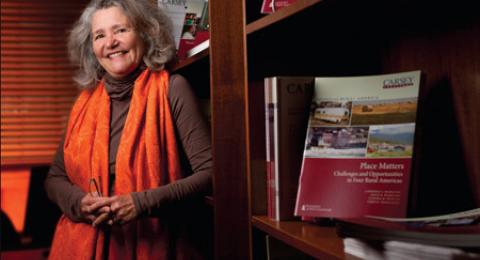
Excellence in Public Service Award, 2010
Carsey Institute
Mil Duncan has always noticed the people mainstream society tends to ignore. As a girl in California, she observed children rummaging in a massive dump outside Tijuana when she went over the border on a school trip. After graduating from Stanford, she and her husband, Bill, moved to the Kentucky coalfields to work on economic development. She earned a doctorate from the University of Kentucky and then, as a sociologist at UNH, turned her attention to the causes of persistent poverty.
Duncan’s research focused on three communities in Appalachia, the Mississippi Delta, and northern New England. She interviewed people at all levels of society and traveled to remote areas where, she says, “there are pockets of people who get forgotten.” Her internationally acclaimed 1999 book, Worlds Apart: Why Poverty Persists in Rural America, revealed how isolation and corruption help maintain a cycle of poverty in Appalachia and the Mississippi Delta, whereas the open social structure in a northern New England mill town encourages upward mobility.
Today, Duncan is far removed from the trailers and tenant shacks of the rural South. Yet she’s helping more people than ever. In 2004, she became the founding director of UNH’s Carsey Institute, which conducts research on vulnerable families and sustainable development. Its 40-some researchers analyze large quantities of data, often gleaning newsworthy results.
Carsey experts have produced more than 100 reports and made more than 250 presentations to lawmakers, funders, and researchers. “We believe that information makes a difference,” Duncan says.
On one visit to Congress, she was able to show powerful legislators that it’s not just the highly visible urban poor who stand to benefit from a tax credit; rural districts have significant numbers of poor people, too. And Carsey researchers’ testimony on another occasion had an impact on provisions for rural children in the draft of a child-nutrition bill.
A number of nonprofits also rely on Carsey research to produce reports and make funding decisions. Michael Laracy, a director with the Annie E. Casey Foundation, describes Duncan and the institute as “mission-critical” partners with his organization. For Duncan, the mission is always the same: to improve the lives of the most vulnerable—and likely to be forgotten—members of society.
—Virginia Stuart
About this Award
This award recognizes and honors exceptional achievements in the area of public service. Individuals who receive this award have engaged in outstanding service activities that are dependent on their academic expertise and that support the mission of the university. The types of activities to be honored should be related to a candidate's academic field and may include exceptional service to local, state or federal governments, to non-profit organizations or agencies, to business or industry, and to the university. UNH benefits-eligible faculty members are eligible, except those who have received this award within the last five years.
